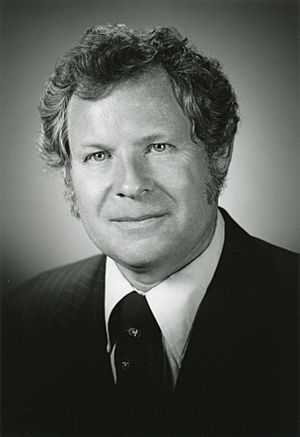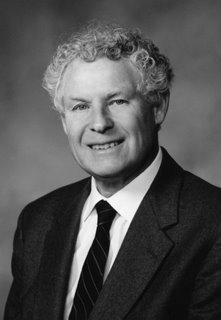Richard A. Snelling facts for kids
Quick facts for kids
Richard Snelling
|
|
|---|---|

Official portrait, c. 1980
|
|
| 76th and 78th Governor of Vermont | |
| In office January 10, 1991 – August 13, 1991 |
|
| Lieutenant | Howard Dean |
| Preceded by | Madeleine Kunin |
| Succeeded by | Howard Dean |
| In office January 6, 1977 – January 10, 1985 |
|
| Lieutenant | Garry Buckley Madeleine Kunin Peter Smith |
| Preceded by | Thomas P. Salmon |
| Succeeded by | Madeleine Kunin |
| Chair of the National Governors Association | |
| In office August 11, 1981 – August 10, 1982 |
|
| Preceded by | George Busbee |
| Succeeded by | Scott M. Matheson |
| Majority Leader of the Vermont House of Representatives | |
| In office 1975–1977 |
|
| Preceded by | Giles Dewey |
| Succeeded by | Jim Douglas |
| Member of the Vermont House of Representatives | |
| In office 1973–1977 Serving with Howard Lunderville (1973–75)
David Curtis (1975–77) |
|
| Preceded by | Mary Thurber |
| Succeeded by | Gretchen B. Morse Sallie Soule |
| Constituency | 30th district (1973–75) 7th Chittenden (1975–77) |
| In office 1959–1961 |
|
| Preceded by | Derick V. Webb |
| Succeeded by | Eustace Thomas |
| Constituency | Shelburne |
| Personal details | |
| Born |
Richard Arkwright Snelling
February 18, 1927 Allentown, Pennsylvania, U.S. |
| Died | August 13, 1991 (aged 64) Shelburne, Vermont, U.S. |
| Resting place | Shelburne Village Cemetery, Shelburne, Vermont, U.S. |
| Nationality | American |
| Political party | Republican |
| Spouse |
Barbara Weil
(m. 1947) |
| Relations | Alice Lee Moqué (grandmother) Charles W. Hornor (great-grandfather) |
| Children | 4 (including Diane) |
| Parents | Walter O. Snelling Helen Marjorie Gehrig |
| Education | Harvard University (BA) |
| Military service | |
| Allegiance | |
| Branch/service | |
| Years of service | 1945–1946 |
| Rank | Technician fifth grade |
| Battles/wars | World War II Occupation of Germany |
Richard Arkwright Snelling (February 18, 1927 – August 13, 1991) was an American businessman and politician. He is best known for serving as the 76th and 78th governor of Vermont. He held this important role from 1977 to 1985 and again from January 10, 1991, until his death later that year.
Snelling was born in Allentown, Pennsylvania. He studied at Harvard University and then started a business career. He founded Shelburne Industries, a company that made ski equipment. He also became active in politics as a Republican. He served in the Vermont House of Representatives and later became governor. His family was also involved in Vermont politics. His wife, Barbara, became lieutenant governor, and his daughter, Diane, served as a state senator.
Contents
Early Life and Education
Richard Snelling was born in Allentown, Pennsylvania, on February 18, 1927. His father was a chemist named Walter O. Snelling. Richard went to public schools in Allentown and graduated from Allentown High School in 1944. He finished school early to join the military during World War II.
In high school, Richard was a strong student and athlete. He was part of the National Honor Society and played on the track, swimming, and wrestling teams. He briefly attended the University of Havana and Lehigh University. At Lehigh, he played football and wrestled. He then transferred to Harvard University. At Harvard, he was on the dean's list, played varsity football, and taught swimming.
Serving His Country
In October 1944, Snelling joined the United States Army Air Corps Reserve. When that program ended, he moved to the Army Enlisted Reserve Corps in 1945. He served in the Army at the end of World War II. He also served during the time when the Allies occupied Germany after the war. His jobs included being an investigator and editing information bulletins.
He reached the rank of technician fifth grade. He was discharged from the Army in October 1946. After his military service, he returned to Harvard. He earned a bachelor's degree in government and economics in 1948. Later, after moving to Vermont, he was active in the United States Coast Guard Auxiliary.
Starting a Business
After college, Snelling worked for Joseph Breck & Sons in Boston, a company that sold kitchen and garden supplies. He quickly moved up to become an assistant to the company's president. Next, he moved to Philadelphia. There, he helped turn around a struggling plant and seed company called Henry A. Dreer, Inc. He and his team successfully made the company profitable again.
In 1953, Snelling moved to Vermont. He became an assistant to the president of Colonial Motors, a car dealership in Burlington. In 1955, he became the manager and later president of Green Mountain Television Corporation, which was an early Cable television company.
In 1957, Snelling started his own company, Shelburne Industries, in Shelburne. This company made wire and metal products. It later became known for making ski racks and other ski equipment. His business was very successful and helped him become a millionaire. He also served on the boards of other companies.
Becoming a Politician
Snelling first ran for a seat in the Vermont Senate in 1956, but he did not win. He then served in the Vermont House of Representatives from 1959 to 1961. He was also a delegate for the Republican Party at national conventions in 1960, 1968, and 1980. From 1963 to 1966, he led the Republican Committee in Chittenden County. He was also a member of the Vermont Republican State Executive Committee.
In 1964, Snelling ran for lieutenant governor but was not successful. He also ran for governor in 1966 and lost. In 1972, he was elected to the Vermont House again. He served from 1973 to 1977. During his last term, he was chosen as the House's majority leader. This meant he led the main party in the House.
Leading Vermont as Governor
In 1976, Snelling was elected governor of Vermont. He was reelected three more times in 1978, 1980, and 1982. He served as governor until January 1985. As governor, Snelling worked to protect the environment. He stopped a plan to mine uranium in Vermont. He also banned the sale of phosphate detergents because they can pollute water. People praised him for using his business skills to help Vermont's economy grow and attract new businesses.
Snelling believed that government worked best when it was closer to the people. He supported President Ronald Reagan's idea of "New Federalism," which aimed to give more power to the states. However, Snelling disagreed when Reagan's plan cut federal funding for programs that were being given to the states.
Snelling did not run for reelection in 1984. In 1986, he ran for United States Senator but lost to the current senator, Patrick Leahy. After leaving office, Snelling focused on his businesses and financial interests. He also enjoyed sailing and traveled a lot, including a trip to Kenya in 1989.
Return to Governorship and Legacy
In 1990, Snelling ran for governor again. He wanted to use his business knowledge and past experience to fix Vermont's money problems. The state was facing an economic recession at the time. He won his fifth two-year term. He spent most of his time working to balance the state's budget and improve its financial health.
To deal with the budget problem, Snelling worked closely with the state legislature. He even visited the Speaker of the House, Ralph G. Wright, to discuss solutions. Together, they worked out a plan that included the largest tax increase in Vermont's history, over $90 million. They also made big cuts to state programs.
Snelling died of a heart attack at his home in Shelburne, Vermont, on August 13, 1991. Howard Dean became governor after him. Snelling was buried in the Shelburne Village Cemetery.
The Snelling Center for Government at the University of Vermont was named in honor of Richard and Barbara Snelling. This center helps train future leaders for government and public service.
His Family's Political Path
On June 14, 1947, Richard Snelling married Barbara Weil. They had four children: Jacqueline, Mark, Andrew, and Diane.
After Richard Snelling's death, his wife, Barbara, continued their family's political legacy. She served as lieutenant governor and later as a member of the Vermont Senate.
Their daughter, Diane B. Snelling, also served in the Vermont Senate. She was appointed to her mother's seat in 2002. She resigned in 2016 to lead the Vermont Natural Resources Board.
Richard Snelling's son, Mark, ran for the Republican nomination for Lieutenant Governor in 2010, but he was not successful.


